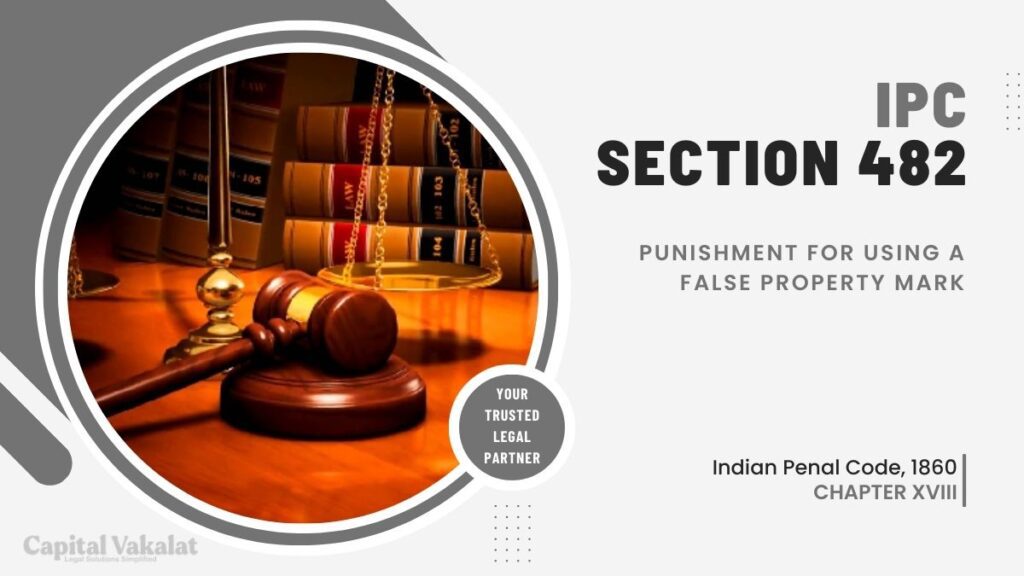The use of false property marks is a serious offense that strikes at the heart of intellectual property protection. In this article, we will delve into the intricacies of Section 482 of the Indian Penal Code (IPC), which specifically addresses the punishment for using a false property mark. Understanding the significance of this section is crucial in safeguarding the rights of individuals and businesses in the realm of intellectual property.

Section 482 IPC is a legal provision designed to deter and penalize the unauthorized use of false property marks. Property marks serve as identifiers, distinguishing the origin and ownership of goods or products. The misuse of such marks not only infringes upon intellectual property rights but also poses risks to consumers who may be deceived by counterfeit products.
Understanding Section 482 IPC
Enacted as part of the Indian Penal Code, Section 482 lays the foundation for addressing offenses related to false property marks. Its evolution can be traced back to the need for a legal framework that safeguards the integrity of trademarks, trade dress, and other distinctive signs associated with products or services.
False Property Marks: What Constitutes an Offense
To comprehend the implications of Section 482 IPC, it is essential to grasp the concept of false property marks. These marks can include trademarks, logos, labels, or any other distinctive sign that falsely represents the origin or quality of a product. The section applies to a wide range of property marks, emphasizing the broad coverage of intellectual property rights.
Elements of the Offense
Violating Section 482 IPC involves several key elements that must be met for an offense to be established. Firstly, there must be a false property mark, intentionally used to deceive consumers or misrepresent the origin of goods. Understanding these elements is crucial for legal practitioners, as they navigate cases involving alleged violations of this section.
For instance, if a product bears a false trademark with the intention to deceive buyers into believing it is a genuine product of a reputable brand, it falls within the purview of Section 482 IPC. The intentional nature of the act is a critical element in determining guilt.
Legal Consequences of Violating Section 482 IPC
The legal consequences for violating Section 482 IPC are significant, reflecting the gravity of offenses related to false property marks. Offenders may face substantial fines and, in certain cases, imprisonment. These penalties are designed not only to punish wrongdoers but also to deter others from engaging in similar practices.
Legal precedents and case studies play a pivotal role in understanding how courts interpret and apply Section 482 IPC. Recent decisions can provide insights into the judicial perspective on the severity of such offenses and the factors considered when determining appropriate penalties.
Protecting Intellectual Property: Role of Section 482 IPC
Section 482 IPC is a crucial tool in the larger framework of protecting intellectual property. Businesses invest considerable resources in developing and maintaining their brand identity, and this section acts as a deterrent against those seeking to exploit or tarnish that identity through the use of false property marks.
The significance of Section 482 extends beyond the corporate sphere to benefit consumers. By penalizing the use of false property marks, the section contributes to consumer welfare by ensuring that individuals make informed choices based on accurate representations of products.
Challenges in Enforcing Section 482 IPC
While Section 482 IPC plays a vital role in intellectual property protection, its enforcement is not without challenges. The legal landscape is dynamic, and new complexities emerge as technology advances. Adapting the section to address these challenges requires a nuanced approach, balancing the need for robust protection with practical considerations.
One challenge lies in the difficulty of identifying and prosecuting offenders, especially in cases where false property marks are used in the digital realm. The global nature of commerce adds another layer of complexity, as cross-border enforcement becomes essential in an interconnected world.
Real-Life Scenarios: Notable Cases
Examining real-life cases provides valuable insights into how Section 482 IPC is applied in diverse situations. One such case involved a multinational company that discovered counterfeit products bearing its trademark in multiple countries. The legal battle that ensued showcased the international reach of Section 482 IPC and highlighted the cooperation needed between jurisdictions to combat the global trade of counterfeit goods.
International Comparisons: How Other Jurisdictions Handle Similar Offenses
A comparative analysis of laws in other countries offers a broader perspective on addressing offenses related to false property marks. Some jurisdictions may have more stringent penalties, while others may focus on preventive measures. Understanding these international approaches can inform discussions on potential improvements to Section 482 IPC and inspire best practices for intellectual property protection.
Conclusion
In conclusion, Section 482 IPC stands as a formidable tool in the protection of intellectual property rights, specifically addressing the misuse of false property marks. Its significance cannot be overstated, considering the economic, legal, and societal implications of unauthorized use of trademarks and related identifiers. As technology evolves and commerce becomes increasingly global, the effective enforcement of Section 482 IPC remains paramount in maintaining a fair and competitive marketplace.
Frequently Asked Questions
What types of property marks are covered under Section 482 IPC?
Section 482 IPC covers a wide range of property marks, including trademarks, logos, labels, and any distinctive signs used to represent the origin or quality of goods.
How can businesses protect themselves from false property mark offenses?
Businesses can take proactive measures, such as registering their trademarks, implementing robust monitoring systems, and educating consumers about genuine products.
Is Section 482 IPC applicable to online platforms and e-commerce?
Yes, Section 482 IPC is applicable to both offline and online scenarios. The use of false property marks in digital spaces is also covered by this legal provision.
What role do consumers play in combating false property mark offenses?
Consumers play a crucial role by being vigilant and reporting suspicious products. Their awareness and actions contribute to maintaining the integrity of the marketplace.